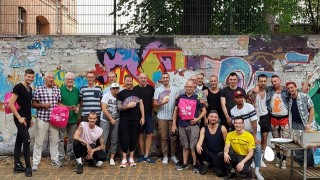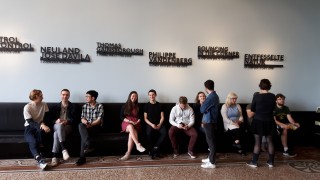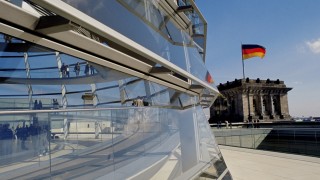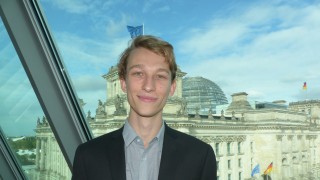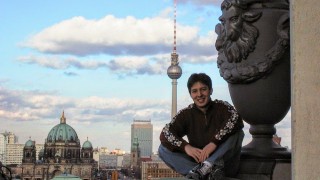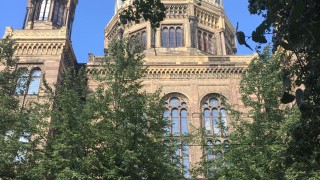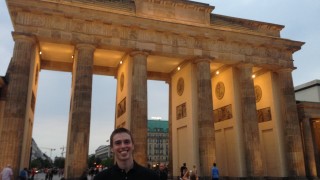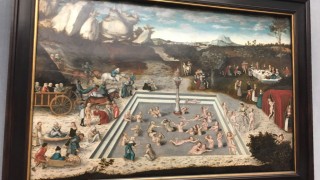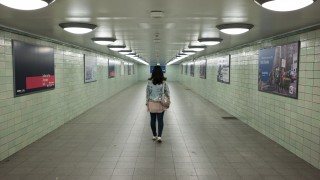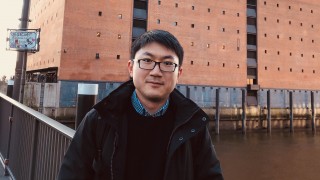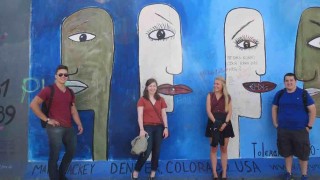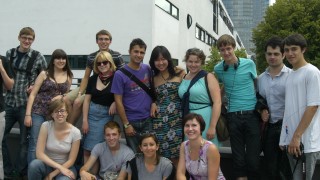Spend a semester, or better yet, a full academic year studying at Berlin's top university in the EU’s economic and political powerhouse. Explore your academic interests through this fully customizable program by choosing from a broad range of German language, BCGS, and/or local university courses. Discover contemporary German life and culture in a dynamic, multicultural city with a vibrant arts scene. Learn from Berlin's advanced knowledge of environmentalism and new technologies. And immerse yourself daily in the city’s remarkable history!
Program Overview
Welcome to the Berlin Consortium for German Studies! The BCGS was established in 1995 and is proud to have over 850 alumni who have studied at the Freie Universität Berlin, some of whom continue to live, study, or work in Germany or in a relevant field. This is a once in a lifetime opportunity to live and study while immersed in the dynamic city of Berlin. Not only will you continue to master the German language, but you will also have a chance to choose courses from a diverse range of disciplines. The BCGS is based at the Freie Universität (FU) Berlin, a premier German university that offers courses which will not only pique your intellectual curiosity, but also help to meet your home school requirements.
Time in Europe significantly shaped my worldview and gave me the confidence to embark on an international career in the future. – AY 2018/19 participant
The first 6 weeks of the program are designed to support you as you adjust to your new life in Berlin. You will take an intensive German language and culture course with the other program participants to help you prepare academically for the additional coursework that follows. The course also introduces you to Berlin through weekly cultural activities that take you out and about in the city.
I enjoyed a high degree of autonomy during my time in Berlin, while BCGS gave me a home away from home that I could always fall back on. – AY 2018/19 participant
A highlight of the program is the unique opportunity to engage with the local community. Past students have participated in volunteer opportunities, student organizations at the FU, local choirs/orchestras, and club sports. If you enroll in the academic year program, there are even more opportunities for both language and cultural immersion. It especially opens up the door for the ability to participate in an internship with local companies and organizations.
The Consortium
The Berlin Consortium for German Studies (BCGS) was founded in 1995 by a group of U.S. universities in partnership with the Freie Universität Berlin (FU). In Spring 1996, the BCGS sent its first student group to study in Berlin. The BCGS provides a framework that supports and helps students, as needed, to live in Berlin and to navigate the German university system. The BCGS also facilitates the annual exchange of FU students who spend the year studying at one of the member institutions. Members of the Consortium are:
- University of Chicago
- Columbia University and Barnard College
- Cornell University
- The Johns Hopkins University
- University of Pennsylvania
- Princeton University
- in association with the University of Notre Dame and Vassar College
The BCGS welcomes qualified students from other institutions to apply and regularly has visiting students as part of the program each term.
Eligibility & Application
Must be currently enrolled as an undergraduate student in good academic and disciplinary standing
Must have completed at least two years of college-level German or the equivalent.
Minimum 3.0 average language GPA
Minimum 3.0 cumulative GPA. Students must also maintain a 3.0 GPA during the semester before going abroad.
Students from universities and colleges outside of the BCGS Consortium School are welcome to apply
HOW TO APPLY
Want to apply? Click the “Start Your Application” button at the top of this page. If the button doesn't appear above, the program is not yet accepting applications. You will be asked to set up a short profile, which will allow us to send you relevant information about your application. Once you’ve created a profile, you will see a checklist of items that you will need to submit. These generally include:
Application questionnaire(s)
Letter(s) of recommendation - language and academics
Official Transcript
Diagnostic Language Evaluation and meetings with director of language program at your school or with Columbia's language representative for visiting students
Home school approval/clearance: please check with your home university's study abroad office about applying for permission to attend the program and to transfer the credit
Application fee (if applicable)
Calendars & Pathways
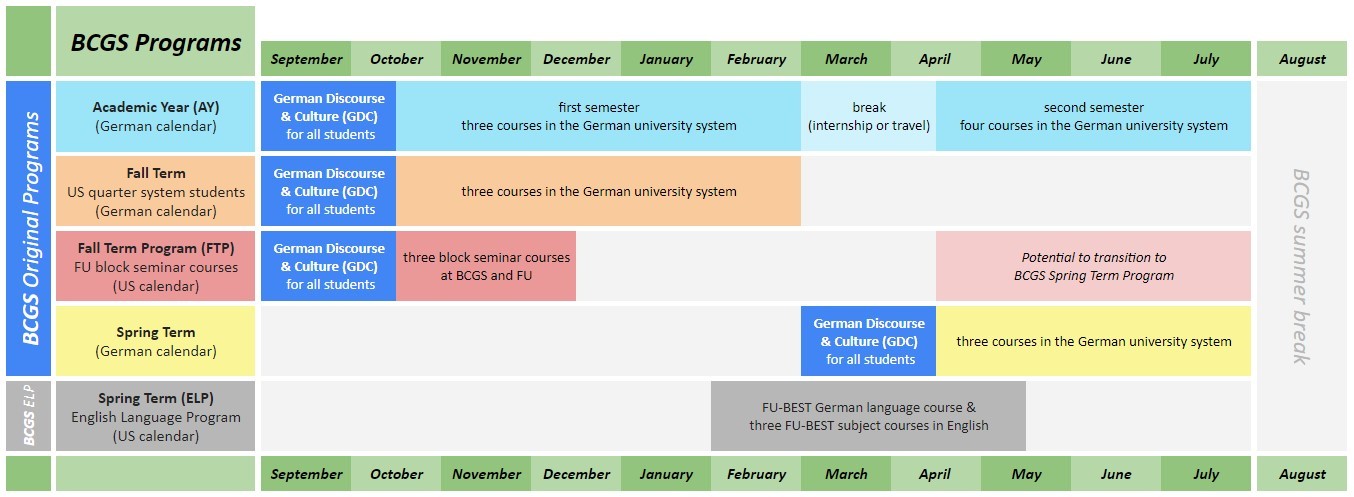
Academics
You will begin the program in an intensive German language course called German Discourse and Culture (GDC) for 6 points. You will then enroll in 3 electives for an additional 9 to 12 points. If you stay for the academic year, you will enroll in 4 electives for 12 to 16 points in the second semester. Those electives may include:
- University courses encompassing most undergraduate disciplines including STEM courses, taught primarily in German
- University courses taught in German for international students
- BCGS Course/s: specially-developed courses, taught exclusively for the program by instructors that use the city of Berlin, its past and present, to showcase relevant topics
BCGS writing consultants (see full description under people) are graduate students who provide extra support to help you adapt to the German University system.
As you will see below, the program has a great deal of flexibility. For students at a more advanced German level, there is the option of full immersion with all classes being taught in German taken alongside German students. For students at lower German levels, there are options for partial immersion (i.e. classes taught in English or classes designed for international students).
For examples of how the BCGS customizes curricula for the students, please click here.
The University reserves the right to withdraw or modify the courses of instruction or to change the instructors as may become necessary.
German Discourse & Culture
German 3335 OC, 3405 OC, and 4335 OC: German Discourse and Culture, 6 points
Instructor: Dr. Detlef Otto, BCGS Language Director, and team
This six-week course is required of all incoming fall and spring students and is taken during the orientation period prior to the start of the German semester. Students are placed into one of the two or three levels depending on the semester and their language abilities.
This course combines extensive language study with an introduction to the discourse of German academic culture, both spoken and written. The goal of the course is to prepare students for successful study in the German university system. Special attention is paid to practical vocabulary for both academic and daily living applications.
At the conclusion of this course, all students will take a language placement exam. Satisfactory completion of this course as well as a satisfactory mark on the language exam are required as a condition of enrollment in courses taught in German at the FU.
CURRICULUM:
Each week, the course focuses on a specific topic relevant to life and study in Berlin. The professors use current newspapers, blogs, podcasts, and relevant videos to support the study of the topics. Past topics have included:
Berlin: its city districts, neighborhoods, and inhabitants; current urban debates (including gentrification and how to deal with it)
German History from 1918-1990; History discovered in literary texts from Haffner to Sallmann
Germany’s political institutions
Germany’s Education System
Germany’s Economy with topics such as Brexit, trade wars, and free and fair trade
Socio-political issues such as migration, the New Right, Jews in Germany today
The Humanities: Art & Theater in Berlin
Exploring German Cultural Heritage outside of Berlin: Dessau, Lutherstadt Wittenberg, Neuruppin, Schloss Branitz bei Cottbus
ACTIVITIES:
Each week, a cultural activity in and around the city of Berlin is organized in association with the course and the week's topic(s) of study. Examples of past activities include:
Guided tours through Berlin districts such as Kreuzberg, Mitte, and Prenzlauer Berg and museums such as Berlinische Galerie, Gemäldegalerie, Hamburger Bahnhof, Deutsches Historisches Museum, Jüdisches Museum, Martin Gropius Bau, Alte Nationalgalerie, Altes Museum, Bode Museum, and Neue Nationalgalerie
Performances at Deutsche Staatsoper Berlin, Deutsche Oper Berlin, Komische Oper as well as at theatres and off-theatres such as Maxim-Gorki-Theater, Berliner Ensemble, Volksbühne Berlin, and Heimathafen Neukölln
Visits at Berlin and federal institutions such as Deutscher Bundestag, including a political discussion with a politician or administrative representative, attendance at a plenary session, and a tour of the dome and Bundeskanzleramt
Day trips to Dessau (Bauhaus), Neuruppin (Fontane, Schinkel), Potsdam (castles such as Sanssouci and Cecilienhof), and Lutherstadt Wittenberg
ADDITIONAL GERMAN LANGUAGE COURSE:
Students who do not receive satisfactory marks (B2.2 CEFR) on the language exam at the end of the GDC course are required to take an additional German language course at the FU. Check with your home institution about whether you will receive credit for this course. Columbia and visiting students have this course listed on their transcript, but they do not receive credit for it.
BCGS Visiting professor course
Fall 2025
Instructor: Professor Katrin Pahl from Johns Hopkins University
Flucht und Migration: Literarische Erkundungen
Germany’s recent history is significantly shaped by migration in different forms, such as flight from Nazi Germany, expulsion from territories lost in WWII, escape from East Germany to the West, labor migration to the FRG (Gastarbeiter) and GDR (Vertragsarbeiter), relocations in the wake of the collapse of the Soviet Union and the Eastern Bloc, and streams of war refugees (most prominently from ex-Yugoslavia in the 1990s, from Syria around 2015, and recently from Ukraine). In this course, we will study how contemporary German literature reflects the experiences of refugees and immigrants. Relevant concepts, such as identity, origin (Herkunft), homeland (Heimat), welcome, integration, and return will be interrogated in our readings and discussions. We will consider the traumatic dimension of the migrant experience (stemming from the reasons for leaving, the run itself, who or what is left behind, the new context with its power dynamics, etc.) and how it diverges across genders and generations. Family dynamics and queer figures will be focal points for the seminar’s approach. Among the plethora of recent literature exploring the topic, Fatma Aydemir’s novel Dschinns, Ronya Othmann’s novel Die Sommer, Sasha Marianna Salzmann’s play Danja, mein dementes Jahrhundert and Yael Ronen’s play Replay might serve as our main examples. In addition, we will familiarize ourselves with the “postmigrant theater” approach, pioneered by Shermin Langhoff, and the work of the “Exilensemble” at the Maxim Gorki Theater in Berlin. We will draw connections with and possibly visit relevant sites, institutions and persons in Berlin.
Electives
Depending on your language level, you will select your remaining courses from the options below. At the end of the German Discourse and Culture Course, BCGS staff assist you in finding appropriate courses for your language level and academic interests. This allows for the course customization for all BCGS students.
Please refer to the grading policy section for the credit amounts for each course type. The policy can also be found under the Grading & Credit Policy drop-down on this webpage.
FU Courses
You will enroll directly into a maximum of 3 courses in the German university system per semester. For students who spend the academic year at the BCGS, they may take 4 classes at the FU in the second semester. Based on the results of the placement exam taken at the end of the German Discourse and Culture Course, BCGS team will assist in finding appropriate courses for your language level and academic interests. This allows for the course customization for all BCGS students. See below under the Freie Universitat section to learn more about the subject areas available.
The following are the types of courses available at the FU that you will decide between:
Courses taught in German, fully integrated with FU students (4 points each)
Courses taught in English, fully integrated with FU students (4 points each)
Courses for international students taught in German for non-native speakers (3 points each)
BCGS Program Courses (may not be offered in Spring 2024)
Selected topics in German studies, 4 points each
BCGS courses take advantage of Berlin and its resources to inform the coursework. Past topics have covered history, art history, literature, theater, and cinema.
Enrolling in BCGS courses, if offered, is highly recommended and strongly encouraged (and only offered to BCGS participants). See below for past offerings.
- German Studies 3600 OC: U.S. Perceptions of Germany and the Germans from Bismarck to Hitler (taught in German by Dr. Carmen Müller, Resident Director): This course explores the role of national stereotypes in the context of German-American relations during the late 19th and early 20th centuries. The US American public had a reservoir of positive and negative stereotypes about Germany and the Germans at its disposal. On the one hand, Germany was admired as a country of cultural and technical progress and of romantic and picturesque landscapes and castles. On the other hand, it was despised as a country of aggressive and inhumane militarism. US American perceptions of the Germans ranged from peaceful, industrious, thrifty, law-abiding, and well-educated to arrogant, violent, submissive, and even barbarian. Because of the geographic distance to Germany, the average American predominantly relied on politicians, commentators, and foreign correspondents for a definition of the German situation and character. How can one account for the existence of such completely contradictory images of one and the same country and nation? Were they only reflections of real changes within Germany and/or of the changing political, economic, and cultural relations between the two countries? How did the government system and economic structure of the United States influence the public perception of Germany? Did such projections foster mis-perceptions and distortions of the German reality?
Germany: An Introduction to Contemporary Politics, Society, and Culture (Spring 2022, Sabine Bierwirth, Freie Universität Berlin)
Das Humboldt-Forum: Science, Culture, and Controversy (Fall 2019, Professor Volker Schröder, Princeton University)
The Grimms and Their Tales (Spring 2020, Professor Volker Schröder, Princeton University)
Das Kulturforum: Microcosm of a changing Berlin (Fall 2018, Professor Aden Kumler, University of Chicago)
Berlin’s Gemäldegalerie: the art of painting and the art of “slow looking” (Spring 2019, Professor Aden Kumler, University of Chicago)
Berlin in Film: A Survey of a City (Fall 2017, Professor Ian Fleishman, University of Pennsylvania)
Queer German Cinema (Spring 2018, Professor Ian Fleishman, University of Pennsylvania)
The Berlin Wall: Divide Stories in Literature and Film (Fall 2016, Professor Andrea Krauss, Johns Hopkins University)
What is Enlightenment? (Spring 2017, Professor Andrea Krauss, Johns Hopkins University)
Too Much to See? Literary Culture and the New Vision in Weimar Germany, 1918-1933 (Fall 2015, Professor Patrizia McBride, Cornell University)
Berlin Stories: History, Storytelling, and Urban Life (Spring 2016, Professor Patrizia McBride, Cornell University)
Berlin/Istanbul: Turkish-German Fiction and Film (Fall 2014, Professor Mark Anderson, Columbia University)
Literature, Photography, Architecture: A Short Cultural History of the German Democratic Republic (Spring 2015, Professor Mark Anderson, Columbia University)
German Contemporary History and the German Historical Debates (Fall 2013, Professor Domingo Gygax, Princeton University)
German Perceptions of Classical Greece (Spring 2014, Professor Domingo Gygax, Princeton University)
For course descriptions of any of the above, please email uge@columbia.edu.
fall term program (FTP)
If you can only study in Berlin following the U.S. fall calendar (September to December), you should apply to the Fall Term Program.
Students would enroll in the following courses:
German Discourse and Culture, 6 points
See “German Language Curriculum” text above for further information.
BCGS Visiting Professor Course, 4 points
See above for further information.
*Two (2) FU Block Seminars, 3 points each
FU block seminars are specially organized intensive courses that are taught in German, from October to December, at the B1 level specifically for FU international students who are non-native speakers of German. Fall 2025 offerings include:
- Germany: An Introduction to Politics, Society and Culture (taught by Dr. Sabine Bierwirth)
- The seminar is dedicated to contemporary Germany and offers an introduction to the country's most important structures. What do parliament, parties, Bundestag, Federal Chancellor, Federal President, Bundesrat do, how does federalism work with its state governments? What do committed civil society and pluralistic ways of life mean? Is there poverty in the rich German welfare state? How is the education system organized? What is behind Germany's reputation as a cultural nation? What do the cultural scene and media landscape look like? Is there a German way of life and typical leisure activities? These are questions that we will explore using texts, especially current newspaper articles and short films. Various excursions are planned.
- Building and Living in Berlin (taught by Dr. Muriel Ernestus)
- The seminar provides an overview of the development of residential buildings in Berlin from the German Empire to the present day. We will deal with urban planning debates as well as architectural features of exemplary residential quarters. In addition to tenement blocks, we will take a closer look at residential quarters of Berlin Modernism, compare GDR housing estates between neoclassicism and prefabricated housing with large housing estates in West Berlin and look at proposed solutions to the housing crisis of the present. Over the course of the semester, we will go on several excursions.
- Berlin and Its Theaters (taught by Dr. Annika Becker)
- Berlin's theater scene is one of the most diverse and innovative in the world, producing a multitude of groundbreaking productions every season that sometimes have a lasting impact on the German theater landscape. The course will deal with the history and development of Berlin's theaters, focusing on both the major theaters and smaller venues and artist collectives. To this end, we will examine historical materials and deal with repertoires and exemplary productions. One focus is on trying out and learning the practice of staging analysis together. The course includes four visits to productions at Berlin theaters.
* Other electives taught in German are not available to you because they follow the German calendar which ends in February.
Freie Universität
Berlin's top university, Freie Universität Berlin is a leading research institution and was established in 1948 under its founding motto, "Truth, Justice, Freedom."
Freie Universität is a full-spectrum university, comprising twelve academic departments and four central institutes that together offer more than 150 different degree programs in a broad range of disciplines in the humanities, social sciences, and natural sciences. The university offers programs toward any academic degree, from bachelor’s and master’s degrees to state exams, doctorates, and habilitation. The university’s extensive professional and continuing education offerings, ranging from individual classes to continuing education master’s degree programs, supplement the academic options available to prospective students.
The broad range of degree programs and disciplines offered at Freie Universität allows students to tailor their studies to their individual interests. Primarily located in Berlin-Dahlem, the campus includes offices and classrooms housed in villas, some large lecture halls, parks, and wooded areas. In addition to many research institutes, the FU Berlin also has a large library system, computer facilities, a center for recreational sports, and a wide array of student organizations. Like most European universities, it is not a residential university, and its student body commutes to the campus from all over greater Berlin.
Subject Areas
To browse the course catalog at the FU, click here.
Freie Universität Berlin offers undergraduate programs in a wide variety of subjects, e.g.
- African Art History
- Ancient Near Eastern Languages and History
- Archaeology of the Ancient Near East
- Art History - Africa / East Asia / Europe and America
- Biochemistry
- Bioinformatics
- Biology
- Business Administration
- Byzantine Studies
- Catalan
- Chemistry
- Chinese / Chinese Studies / East Asian Studies / Chinese language and society
- Classical Archaeology
- Comparative Literature
- Computer Science
- Digital Media and Technology
- Economics
- Educational Science
- Egyptian Archaeology
- Egyptian Philology
- Egyptology
- English Language and Literature
- Film Studies
- French / French Language / French Studies
- Galician Language and Literature
- Geographical Sciences
- Geological Sciences
- German Language and Literature
- German and French Literature and Cultural Studies
- Greek Language and Literature
- Greek Literature in Translation
- Hebrew
- History
- History and Cultures of the Middle East
- History and Cultures of the Middle East (Concentrations: Arabic Studies / Iranian Studies / Islamic Studies / Semitic Studies / Turkish Studies)
- Humanities in an Interdisciplinary Context (GiK)
- Italian / Italian Language and Literature / Italian Studies
- Japanese / Japanese Studies / East Asian Studies
- Jewish History / Jewish Studies
- Jewish Studies
- Korean / Korean Studies / East Asian Studies
- Language and Society
- Language – Literature – Culture: Dutch
- Languages of Classical Antiquity: Greek / Latin
- Latin American Studies
- Latin Language and Literature
- Management
- Mathematics
- Media and Communication Studies
- Medieval Latin Language and Literature
- Meteorology
- Modern Greek Language and Culture / Modern Greek Studies
- North American Studies
- Philosophy
- Physics
- Political Science
- Portuguese-Brazilian Studies (with or without prior knowledge of the language)
- Prehistoric Archaelogy
- Psychology
- Religious Studies
- Social and Cultural Anthropology
- Spanish (with and without prior knowledge of the language)
- Spanish Language and Literature with Latin American Studies
- Studies in Ancient Civilisations (Concentrations: Ancient Near Eastern Archaeology / Ancient Near Eastern Languages and History / Classical Archaeology / Egyptology / Prehistoric Archaeology)
- Theater Studies
STEM Courses
Each semester, a number of BCGS students in high academic standing and with an advanced level of German successfully enroll in STEM courses at the FU. In order to best prepare to enroll in STEM courses, students are encouraged to plan their courses in advance (as early as the application process). There are no BCGS subject tutors, but FU group tutorials will accompany STEM lectures to help students pass exams. In addition, the BCGS writing consultants will help students in dealing with the technical vocabulary.
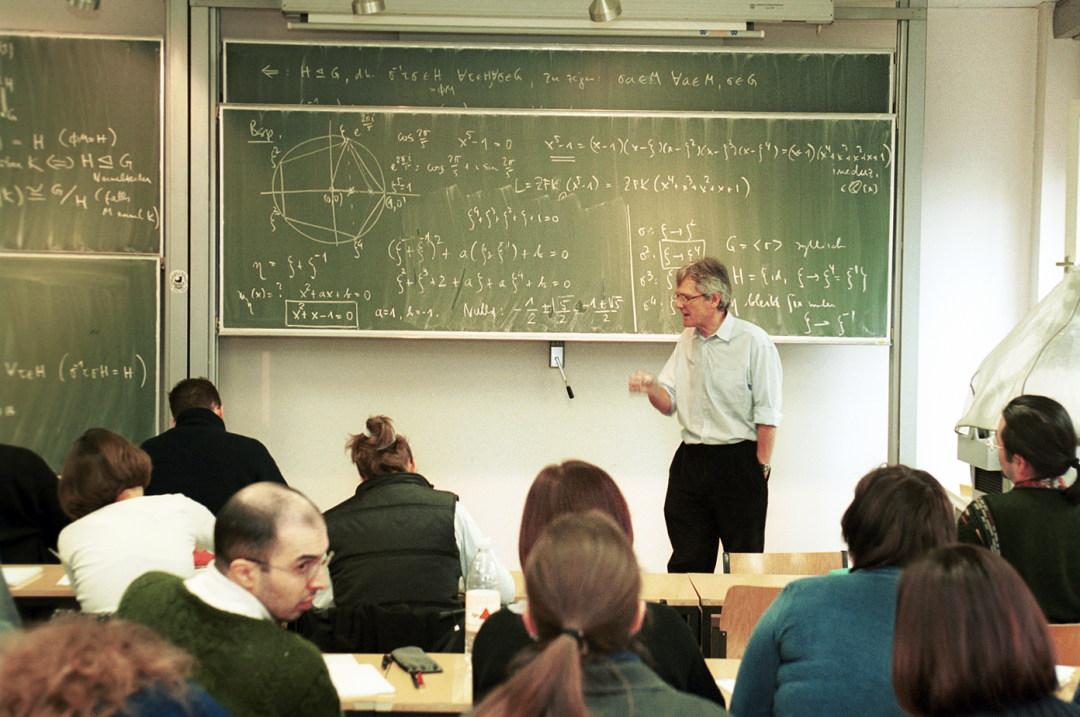
Below are lists of STEM Departments and course titles students from the BCGS have enrolled in and successfully completed from 2012-2022.
Departments:
- Chemistry
- Computer Applications
- Computer Science
- Earth Sciences
- Economics
- Economics & Management
- Geosciences
- Mathematics
- Operations Research & Financial Engineering
- Physics
- Psychology
Course Titles:
- Analytical Mechanics
- Artificial Intelligence
- Behavioral Public Economics
- Biological Psychology II
- Code Semantic
- Complex Analysis (Course in English)
- Computer Architecture
- Database Systems (course in German / English)
- Developmental Psychology
- Distributed Systems
- Economic Growth (Course in English)
- Elec. Data Processing I
- Environmental Economics
- Experiential Neurolinguistic
- Financial Crises & Monetary Systems
- Game Theory
- Government Economic Policy
- Health Psychology
- Human Geography II
- International Trade & Policy (Course in English)
- Investment & Finance
- Labor Market Theory
- Linear Algebra I
- Markets/Competition/Consumers
- Organic Chemistry Empiric Spectroscopy
- Organic Chemistry I
- Paleontology & Earth History
- Practice of Clinical Psychology
- Probability II
- Research in Clinical Psychology
- Rural Change (Course in English)
- Semantics of Programing Languages
- Social Psychology
- Social Science Research Methods
- Socialization & Learning
- Stress and Health
Special Interests/Cross Registration
Cross Registration at other Berlin Institutions of Higher Education:
Depending on capacity, students with special interests may be able to enroll in courses at local institutions such as the Humboldt Universität zu Berlin, the Technische Universität Berlin, the Universität Potsdam, and the Kunsthochschule Berlin-Weissensee. Non-studio courses may be available at the Universität der Künste Berlin and the Hochschule für Musik "Hanns Eisler."
The University reserves the right to withdraw or modify the courses of instruction or to change the instructors as may become necessary.
Grades and Transcripts
Grading & Credit Policy
Click here for the Columbia Semester/Academic Year program grading policies.
For credit amounts for each course type, please click ![]() here.
here.
Transcripts
All courses taken on the program are converted to an American grading scale and transmitted to students as follows:
Columbia students: Grades appear on SSOL and your transcript as semester grades from courses taken at Columbia. For more information, please see the section on Academic Credit in Steps to Study Abroad.
Barnard students: Grades appear on eBear and your transcript as any semester grades from courses taken at Barnard. For more information, please see the section on Credit and Transcripts for Barnard Students on our Barnard student pages.
Cornell, Johns Hopkins, Princeton, University of Chicago, University of Notre Dame, University of Pennsylvania, and Vassar students: Grades are entered into Columbia's SSOL system and you will need to request a transcript to obtain your final grades. Please see the section on Credit and Transcripts for Non-Columbia Students on the Non-Columbia student pages
Non-Columbia students: Grades are entered into Columbia's system and you will need to request a transcript to obtain your final grades. Please see the section on Credit and Transcripts for Non-Columbia Students on the Non-Columbia student pages.
If you would like to request additional copies of your Columbia transcript, please see the Columbia Registrar’s instructions: https://registrar.columbia.edu/content/transcripts. There are no fees for additional transcripts.
IMPORTANT: Please note that the timing of receiving transcripts varies from the U.S. academic calendar. Given the different U.S. and German academic calendars, grades are usually not received from your FU professor(s) until late April if you studied in Berlin for the fall semester and late October for the spring semester. If you need to have grades posted earlier, please talk to your university professors about submitting grades to the BCGS office as early as possible.
Life in Berlin
Curious about the student experience? Be sure to read Student Stories on our website and check out additional student testimonials on GoOverseas.
HOUSING
The BCGS recommends the following options for participants. Please click on the option websites for updated pricing.
Students who wish to live in a pre-arranged apartment or dorms must commit to this option, prior to the start of the program by following the FU dorm application deadlines (late November for spring students, beginning June for fall students).
To learn more about the housing details and the application process, visit the FU website.
Student Apartments
Student apartments provide a single room with a private bathroom and kitchenette. They are, however, dependent on availability. If there is no apartment available, you are guaranteed a fallback option in one of the dorms. Details will be discussed during pre-departure meeting.
Dorms
Dormitory living (which includes the Studentendorf Schlachtensee/Student Village and the Studierendenwerk Berlin) is also available to BCGS students. Please see details below:
- The Studentendorf Schlachtensee (Student Village) or
- Studierendenwerk Berlin (Dormitory Goerzalle or Dormitory Halbauer Weg)
MEALS
Berlin is a great food destination. The high ethnic diversity of its citizens contributes to the vast variety of its restaurants and food offerings from all over the world. There is a strong movement towards organic and regional produce as well as vegetarian and vegan cuisine. Nevertheless, the infamous Döner and Currywurst still have their place among the new trends. You will have easy access to your favorite food at fresh food markets, supermarkets, street vendors and on campus. At the Freie Universität, there are several cafés, cafeterias, and a dining hall which is mostly vegetarian. In addition, there are a few private restaurants and cafés around campus. However, please be aware that there are no meals included and there is no meal plan for BCGS students.
ACTIVITIES
The program offers many activities that will help students engage with the cultural life of Berlin.
Internships
Academic year students who are motivated to apply their German in a professional setting and gain experience in a particular field can apply for an internship. The BCGS staff provides assistance in finding internships, but students must be proactive in pursuing and securing placement with their chosen organization. Past internships have included:
- Deutsche Gesellschaft für Auswärtige Politik (DGAP) (foreign policy think tank)
- Mayor's office (Division for Protocol and International Affairs)
- Senatsverwaltung für Stadtentwicklung (Berlin government office for urban planning)
- Komische Oper (Opera House)
- Benjamin Franklin Krankenhaus (FU hospital)
- Schwules Museum (Museum for LGBT history and culture)
- Museum THE KENNEDYS
- BerlKönig (ride-pooling service)
- Start-Up Companies
- Art galleries
Spring semester students who are interested in interning can consider interning during the months of January and February prior to the start of the program. However, to do so, the visa process would be separate from the BGCS visa process and you would have to arrange your own housing.
Please note that according to the German Federal Employment Agency (Bundesagentur für Arbeit), you have to meet the following requirements to receive a visa for internships:
- The internship must be closely related to your field of studies (documented by home school)
- You can provide evidence of at least 4 semesters in this field
- Your internship company has applied for confirmation of your internship at the Federal Employment Agency
In order to research options for internships in Berlin, students are encouraged to use the resources of their home institutions career services office.
Volunteering
Instead of an internship, students in recent years have participated in volunteer work throughout Berlin. This is much easier for Spring semester students to participate in than in an internship. Opportunities have ranged from teaching to social, cultural and ecological projects. Students interested in socio-political issues have found ways through volunteer work to contribute to the German “welcome culture,” helping refugees integrate in German society.
The “Freiwilligenagenturen,” non-profit agencies, help to coordinate volunteer work in the Berlin districts. Examples of volunteer projects include organizing grass root activities, mentoring kids with learning disabilities, helping LGBTQ* organizations, integrating refugees, and supporting homeless people.
Trips & Excursions
The program organizes a series of excursions and cultural activities in and around Berlin, which are integrated into the academic program. These trips are intended to provide an insider's look into Berlin and Germany, and they often provide access to people and places students might not otherwise have.
Cultural Program and Field Trips
During the first six weeks of the program, a trip is organized on a weekly basis. Examples of past activities include:
Guided tours through Berlin districts such as Kreuzberg, Mitte, and Prenzlauer Berg and museums such as Berlinische Galerie, Gemäldegalerie, Hamburger Bahnhof, Deutsches Historisches Museum, Jüdisches Museum, Martin Gropius Bau, Alte Nationalgalerie, Altes Museum, Bode Museum, and Neue Nationalgalerie
Performances at Deutsche Staatsoper Berlin, Deutsche Oper Berlin, Komische Oper as well as at theatres and off-theatres such as Maxim-Gorki-Theater, Berliner Ensemble, Volksbühne Berlin, and Heimathafen Neukölln
Visits at Berlin and federal institutions such as Deutscher Bundestag, including a political discussion with a politician or administrative representative, attendance at a plenary session, and a tour of the dome and Bundeskanzleramt
Day trips to Dessau (Bauhaus), Neuruppin (Fontane, Schinkel), Potsdam (castles such as Sanssouci and Cecilienhof), and Lutherstadt Wittenberg
Study Trips
One-day trips to destinations to cities in Germany will be available to student participants. Examples from the past have been Hamburg, Leipzig, and Dresden.
Daily Living and Schedule
The German University system is very different from the US University system. Students can expect for their classes to meet just once a week for 1.5 hours at a time. During the first 6 weeks of the program, the German Discourse and Culture course meets 4 days a week from 9 am until 1:15 pm. In general, Wednesdays are reserved for cultural excursions. In the fall semester, there are usually only two levels of German since there are fewer students and in the spring semester, three levels are usually offered.
Part of the academic day will be spent commuting to the FU campus. Like most European universities, it is not a residential university, and its student body commutes to the campus from all over greater Berlin. You will likely commute 30-45 minutes to class.

Fitness and Wellness
There are countless possibilities to enjoy your free time in Berlin. The Freie Universität offers a vast variety of sports programs, health sports, dancing and more. To explore these options visit this site. Furthermore, there are some 2,500 sports clubs in Berlin offering more intensive training in virtually any field. There are also continuing education centers, the so-called “Volkshochschulen,” and music schools to learn something new or improve your skills in languages, dance, Yoga, fine arts, drums, politics and cultures, cooking, etc. While keeping you mentally fit, all of these opportunities also open up Germany society, allowing you to get more immersed during your time in Berlin.
Past BCGS students have spent time learning how to sail once a week on the big lakes, travelled through Germany with their rugby team, “advance-lunged” into fencing lessons, moved up to second league with their soccer team, or sung in the “Collegium Musicum,” the joined universities’ choir for the Queen of England. The possibilities to stay fit both mentally and physically while you are in Berlin are endless!
LOCATION
Berlin
Berlin is the capital city and the largest city in Germany. The city has become known for its art scene and entrepreneurial environment. Berlin is home to world renowned Universities, museums, orchestras, and entertainment venues. This city, rich in history and historical monuments, will provide endless cultural outlets for city dwellers and visitors alike.
Since the city's reunification in 1990, Berlin has been characterized by change and invention. The dichotomy between old and new provides a constant reminder of Berlin's complex history. After the fall of the Berlin wall, Berlin emerged as the cultural and economic capital city of Germany, alive with a sense of transformation and progress. A vibrant nightlife, exciting art scene, and myriad cultural venues contribute to Berlin's status as one of Europe's most cosmopolitan and sophisticated urban centers.
Visits to museums, galleries, cultural and political institutions, and historic sites and landmarks all contribute to providing a deeper understanding of Germany's past and its current role in the European Union and global affairs.
Freie Universität
The BCGS facility is located on the main FU campus in Dahlem and functions as a home base for program participants. The building houses administrative offices for the BCGS staff; a small library of books, magazines, and newspapers; classroom space where students convene for the Selected Topics courses; and limited computer facilities where students may check e-mail and W-LAN access for their own laptops.
Please find two video introductions to the Freie Universität Berlin here: Campus Tour and A Short History.
The second film "offers a glimpse into the founding history of Freie Universität, as well as an impression of the diverse research and academic programs of one of the most prestigious universities in Germany. The film portrays several students and scholars and gives an overview of the history of Freie Universität, from its founding in 1948 on the historically significant Dahlem research campus, to the 1960s student movement and the changes following the fall of the Berlin Wall in 1989, on to its success in the Excellence Initiative of the German federal and state governments.”
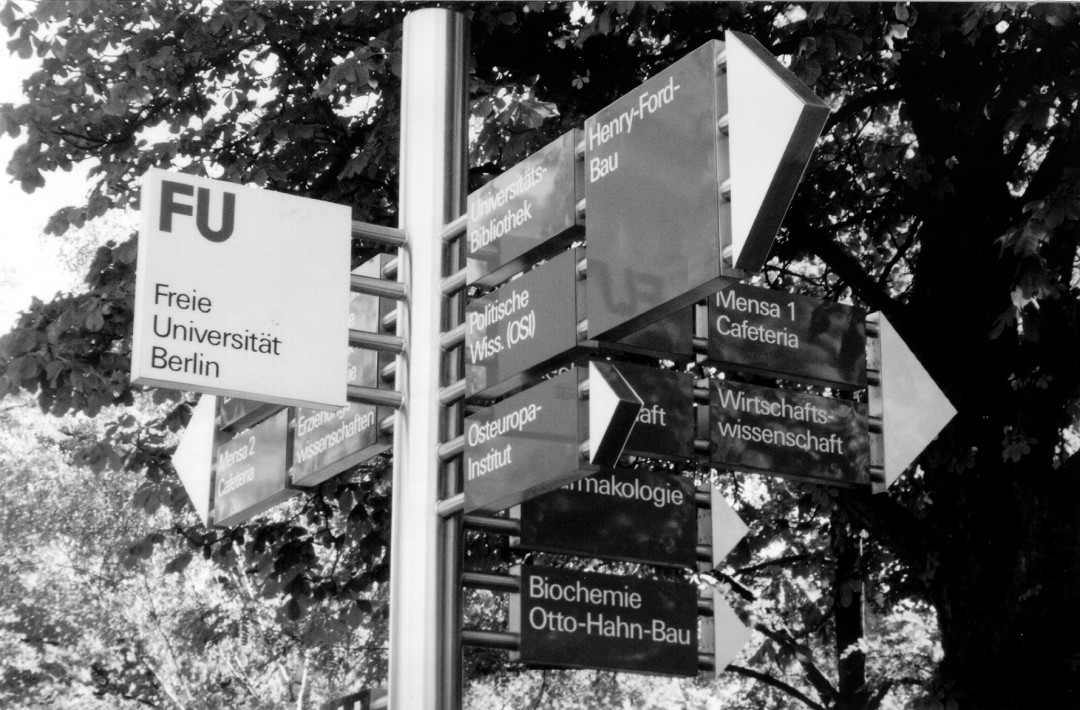
People
Staff
Resident Director
Responsible for program operations, development and oversight of the academic program, student affairs, and administrative and financial management.
Carmen Müller has been the Resident Director since the program's inception. A native of the Southwest of Germany, she moved to Berlin in 1988 and experienced the fall of the wall and its aftermath first-hand. As a master’s degree student, she spent an academic year as a Fulbright fellow at the New School for Social Research in New York City. Dr. Müller received her Doctor of Philosophy from the John F. Kennedy Institute at the Freie Universität Berlin and is a historian specializing in 19th- and 20th- century European and German history, German-American relations, and methodology. Dr. Müller also teaches a course during the spring semester and loves the vibrant life of Berlin.
Assistant Administrative Director
Assists the Resident Director in program operations and student affairs.
Nikolaj Blocksdorf has been working with BCGS since 2012. As a genuine Berliner, he offers the students unique insights into the rich diversity of his native city. Mr. Blocksdorf is also familiar with the students’ perspective of educational exchange: He stayed with a host family during his high school year in Orange County, California. Later, when studying North American Studies and Islamic Studies at the Freie Universität Berlin, he left his comfort zone to live for seven months in Damascus, Syria.
Writing Consultants
The BCGS employs writing consultants who are graduate students and an integral part of the program’s support structure. They are available to assist students during the German Discourse and Culture course and throughout the regular university semester until the program ends. We strongly recommend that each student works on a weekly basis with their writing consultant to ensure a successful completion of their course work. Furthermore, the writing consultants provide invaluable insights into Berlin’s culture and everyday student life.
FACULTY
BCGS Visiting Professor
On an annually rotating basis each academic year, the BCGS member institutions usually send a faculty member to Berlin as the BCGS Visiting Professor to oversee the academic program and teach a course on a selected topic in German Studies.
Fall 2024 Visiting Professor
Javier Samper Vendrell is Assistant Professor of German Studies and core faculty in the Program in Gender, Sexuality, and Women’s Studies at the University of Pennsylvania. His research focuses on LGBTQ+ history, film, literature, and print culture in the early twentieth century. His book The Seduction of Youth: Print Culture and Homosexual Rights in the Weimar Republic was published the University of Toronto Press in 2020. He is currently working on a second monograph, Fear of the Bogeyman: Children, Queerness, and Monsters in German Culture.
Previous BCGS Visiting Professors
- 2019-20: Volker Schröder, Princeton University
- 2018-19: Aden Kumler, University of Chicago
- 2017-18: Ian Fleishman, University of Pennsylvania
- 2016-17: Andrea Krauss, Johns Hopkins University
- 2015-16: Patrizia McBride, Cornell University
- 2014-15: Mark Anderson, Columbia University
- 2013-14: Marc Domingo Gygax, Princeton University
- 2012-13: Jonathan Lyon, University of Chicago
- 2011-12: Simon Richter, University of Pennsylvania
- 2010-11: Arthur Groos, Cornell University
- 2009-10: Katrin Pahl, The Johns Hopkins University
- 2008-09: Warren Breckman, University of Pennsylvania
- 2007-08: Volker Berghahn, Columbia University
- 2006-07: Tom Leisten, Princeton University
- 2005-06: David Levin, University of Chicago
- 2004-05: Cordula Grewe, Columbia University
- 2003-04: Tom Safley, University of Pennsylvania
- 2002-03: Andreas Huyssen, Columbia University
- 2001-02: Rochelle Tobias, Johns Hopkins University
- 2000-01: Tom Levin, Princeton University
- 1999-2000: Andreas Gailus, University of Chicago
- 1998-99: Karl Otto, University of Pennsylvania
- 1997-98: Cyrus Hamlin, Yale University
- 1996-97: David Wellbery, Johns Hopkins University
- Spring 1996: Mark Anderson, Columbia University
Director of the Language Program
Detlef Otto studied Philosophy, Comparative Literature, and Social Sciences in Darmstadt and at the Freie Universität Berlin; he holds a Ph. D. in Philosophy. He has taught German as a Foreign Language since 1988. After having worked as a lecturer of the DAAD at the Università degli studi di Bologna / Italy from 1994-97, he went through an intensive training course at the Goethe Institut Berlin for language instructors. Since 1999, he is teaching intensive courses at the Goethe Institute. Since 2003, he has also worked in the field of teacher training. In the Fall 1999, he started his work as Language Director for the BCGS.
Financial Considerations
Many students use a combination of federal student aid and home school grants to fund their undergraduate studies. Many, if not most, of these funds are applicable to studying abroad for a semester or academic year. The costs of studying abroad during the semester or academic year are frequently comparable to those of staying on campus.
All students should work with their home school financial aid office to determine what aid is available for studying abroad.
Please see below for the cost breakdowns for detailed information on all program-related expenses:
Academic Year 2025-26 & Fall Term Program:
- Cost Breakdown for Columbia Students
- Cost Breakdown for Barnard Students
- Cost Breakdown for Consortium Students
- Cost Breakdown for Visiting Students
Spring 2026:
- Cost Breakdown for Columbia Students
- Cost Breakdown for Barnard Students
- Cost Breakdown for Consortium Students
- Cost Breakdown for Visiting Students
*Please Note: Tuition and fees are subject to Board of Trustee approval and may change*
Financing Your Studies in Berlin
Students may apply for the following scholarship applicable to this program:
For more information and resources on financing your time abroad, please see the pages below:
Withdrawal and Refund Policy
If you decide to withdraw from the program after confirming your participation, please be aware of the financial consequences and the office policies by reviewing the Withdrawal and Refund Policy.
Find Out More
Speak to an Adviser: Want to learn more? Make an appointment to chat with the adviser for this program! You can also email them with any questions, or to arrange a meeting if you are unable to make the listed times.
Applying: Make sure to review the dates and deadlines section at the bottom of the page.
Resources: View our Steps to Study Abroad page to see advice on Where to Begin, how to Prepare to Go, and what you need to know when Returning from Abroad. We will share many resources with you throughout the application and pre-departure process for preparing to study abroad.
We recommend reviewing the following before you apply:
Having a valid passport is one of the key components of going abroad. See more on our Passports and Visas page.
Need help deciding which semester, program, and experience are right for you? Check out our Choosing a Study Abroad Program page.
Learn about finances and study abroad on our Financial Considerations page.
If considering summer study abroad, review guidance on our Summer Study Abroad page.
Plan ahead and prepare for your health, well-being, and accessibility abroad by reviewing our Well-Being Abroad resources and Identity and Diversity Abroad page.
Once accepted, make sure to review the Prepare to Go page for more resources and information about preparing for your experience abroad.

